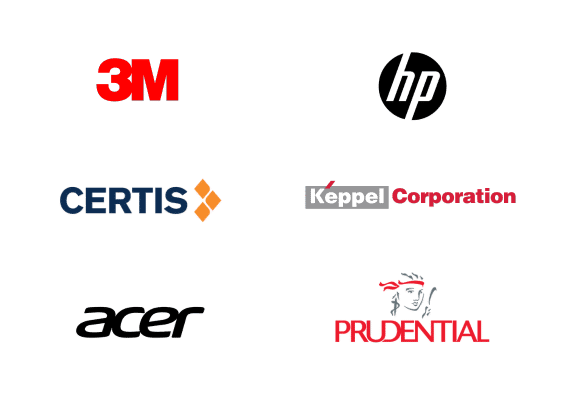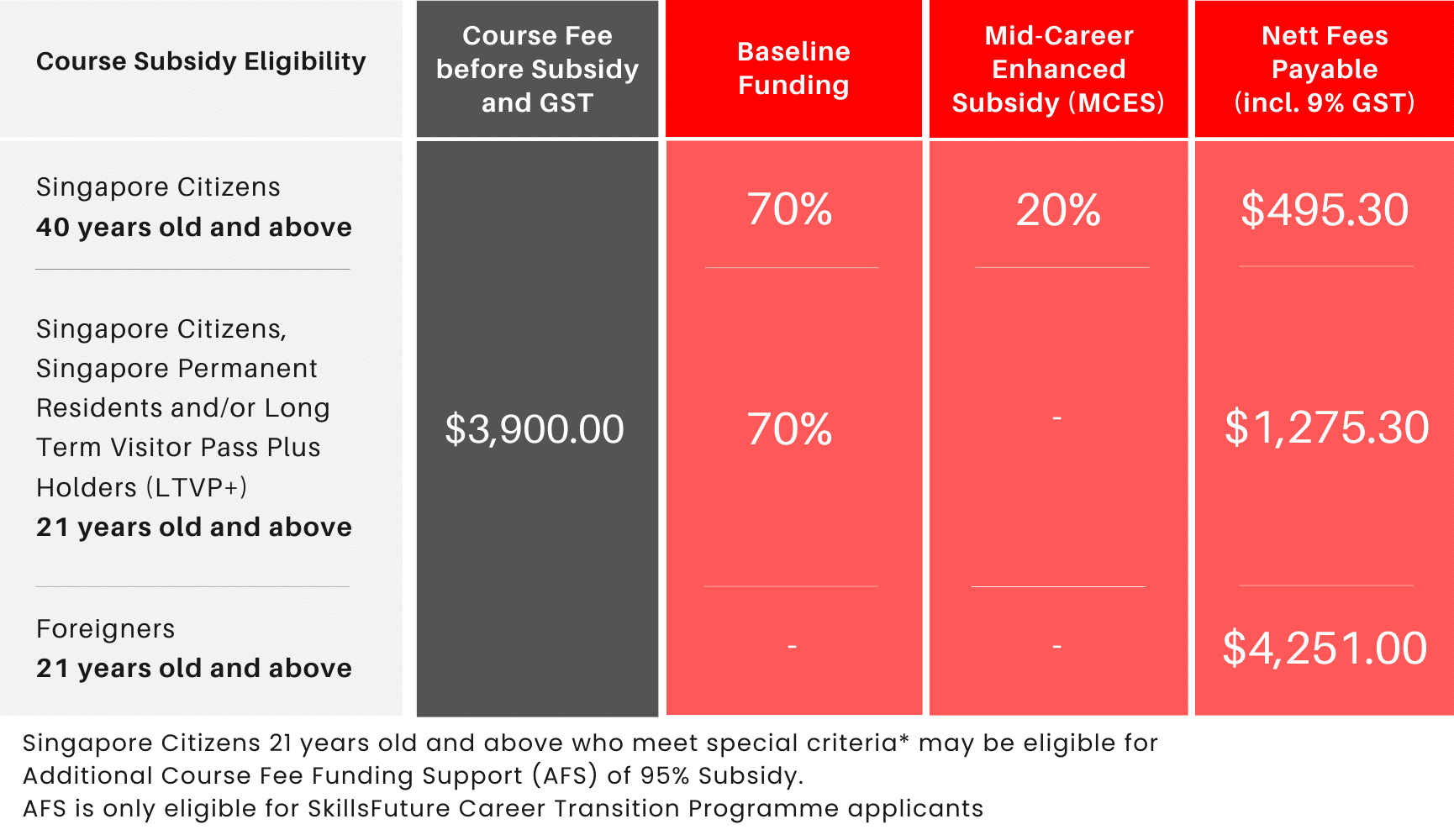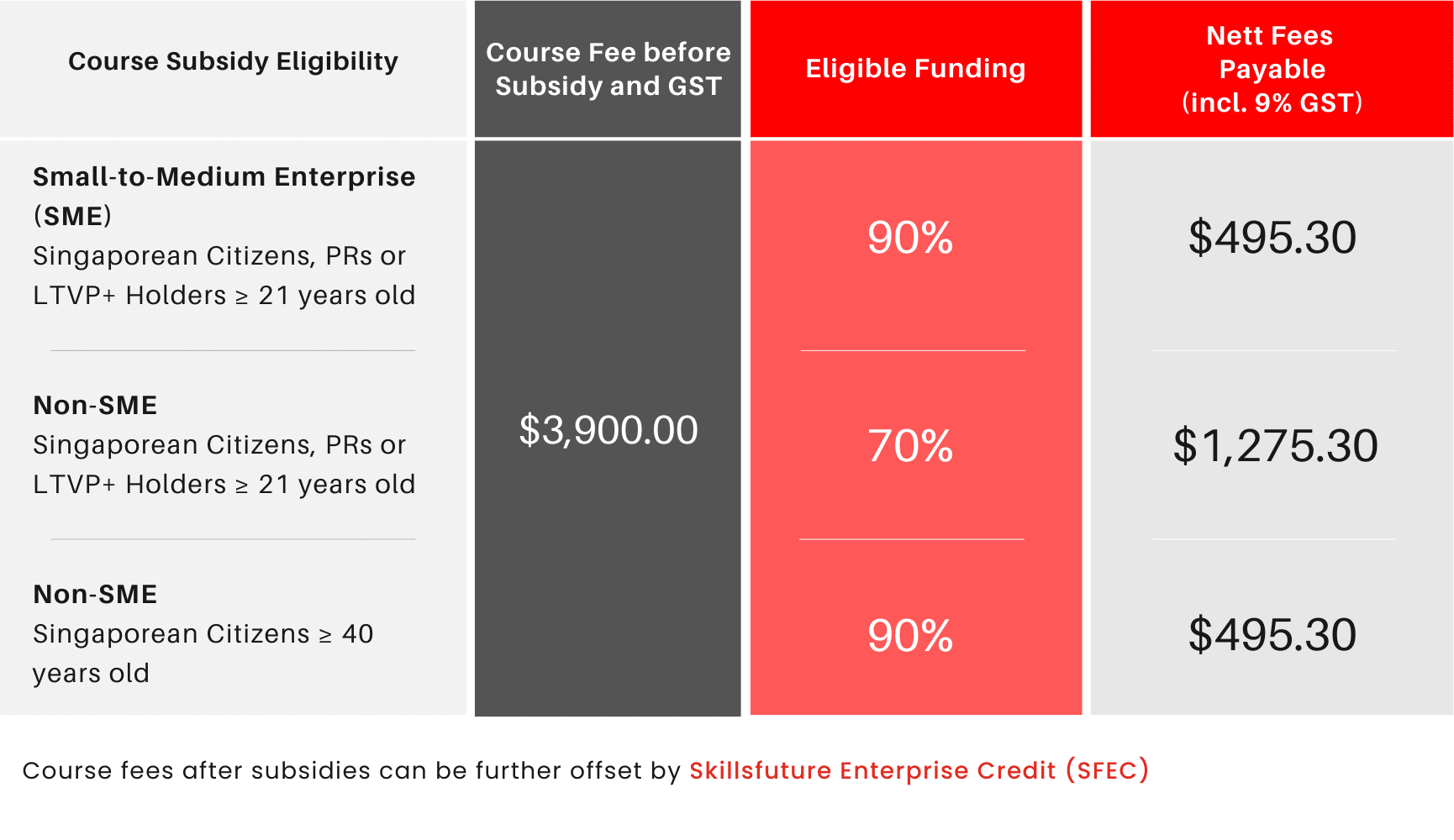WHY TAKE @ASK TRAINING'S ADVANCED CERTIFICATE PROGRAMME
When you learn with us, you will get certified by a recognised certification body, the Singapore Workforce Skills Qualifications (WSQ). On top of that, you will also acquire extensive knowledge from highly experienced industry practitioners in Singapore who develop and deliver top quality course content through experiential hands-on learning methodologies.
-
Industry-recognised WSQ Statement of Attainments
-
Real-world hands-on projects
-
Comprehensive, up-to-date curriculum and courseware
-
Career advisory and resources support
Our Clients



Thank You For Downloading The Advanced Certificate in Digital Marketing Brochure
Have Any Questions?
Submit the form below and our programme consultants will get back to you shortly.
"*" indicates required fields
Get Certified in the WSQ Advanced Certificate in Digital Marketing
Are you a Career Seeker, Business Owner, or a Marketer?
Career Seeker

Salaries for Digital Marketers range from $30,000 for entry level positions to $180,000 per annum for Head roles. – Sources: PayScale and Glassdoor.
However, entry can be difficult as employers demand a wide range of skills and comprehensive portfolios that demonstrates experience.
Business Owner

Hiring, managing, and retaining talent then becomes a cyclical challenge on top of struggling to understand digital marketing return on investment (ROI).
- Obtain a clear birds eye view of how the various digital marketing channels integrate to generate ROI
- Be able to develop customised digital marketing strategies for your own business
- Be able to make better informed decisions on whether to outsource campaign implementation to digital marketing agencies, retain them in-house, or a mix of both.
Marketer

Many marketers in the past decade have struggled to keep up with the ever-changing digital marketing landscape until today.
- Enable you to transition from a traditional marketer to a digital marketer
- Allow you to better manage digital marketing campaigns through external agencies or in-house
- Equip you with the ability to prove your contributions to your company and advance your career in marketing.
What is the SkillsFuture Career Transition Programme (SCTP)?
The SkillsFuture Career Transition Programme (SCTP) is a government initiative in Singapore designed to assist mid-career individuals in acquiring new skills and knowledge to facilitate a career transition. This programme is geared towards individuals who wish to switch industries or occupations due to changes in the job market, technological advancements, or personal career goals.
Here are some key features and components of the SkillsFuture Career Transition Programme:
Career Guidance: The programme also provides career advisory services and guidance to help individuals get placed in job roles, such as interview preparation, resume tips and more.
Discover Your Path: SCTP vs. Non-SCTP
SCTP Pathway
For those aspiring to kickstart a career in digital marketing.- Structured Learning: Dive into a comprehensive curriculum, equipping you with the latest industry knowledge and skills.
- Coaching & mentorship: Benefit from post-course coaching and mentorship, fine-tuning your skills and helping you apply learnings to your project.
- Career Advisory and Resources Support: Our dedicated career services team will provide various assistance and resources to enhance your job search.
Non-SCTP Pathway
For those seeking knowledge without the commitment of a job transition.- Flexible Learning: Access the same five modules, but on your schedule. No need to follow set course intake dates; choose the course dates that suit you.
- Independent Journey: As a non-SCTP learner, you won’t receive post-course coaching or mentorship, and we won’t place you in a job. Your focus is solely on learning.
- Earn Your Certificate: Upon successful completion, you’ll still earn your Advanced Certificate in Digital Marketing, a testament to your expertise in the field.
Advanced Certificate in Digital Marketing Course Modules & Curriculum
Module 1: Digital Marketing Essentials
Learning Outcomes
Upon completion of this course, trainees should be able to utilise marketing mix frameworks to:
- Apply the principles of marketing mix (Product, Price, Place, and Promotion) within a digital marketing framework to analyse an organisation’s marketing mix.
- Describe the concept of customer personas, including mapping the online customer journey, and understanding key touchpoints for optimal consumer engagement.
- Proficient in utilising digital marketing analytics tools, including identifying relevant KPIs, assessing the ROI of digital strategies, and recognising emerging trends that offer retail marketing opportunities.
Learning Units
1. Digital Marketing and Marketing Mix
- Introduction to Digital Marketing in the Context of the Marketing Mix
- The Evolution of the ‘Product’ Element in the Digital Age
- Pricing in the Digital Era
- Digital Distribution (Place)
- Promotion in Digital Marketing
2. The Digital Customer
- Creating digital customer personas
- Mapping the digital customer journey and touchpoints
- Importance of analytics in understanding online consumer behaviour
3. Digital Strategy Impact
- Introduction to Digital Strategy Impact
- Evaluating the Impact of Digital Strategies
- Digital Marketing and Analytics Tools
- Emerging Trends
Hands-on Project-based Assignment
At the end of the module, the trainees should be able to demonstrate proficiency in conducting digital marketing mix analysis for a Startup.
Module 2: Digital Advertising
Learning Outcomes
Upon completion of this course, trainees should be able to utilise marketing mix frameworks to:
- Analyse media types by assessing their impact and coverage, including identifying media usage trends and integrating multiple platforms for effective communication and advertising.
- Formulate and execute a digital advertising strategy tailored to specific campaign objectives, including the selection of appropriate digital media channels, budget allocation, and key performance indicators, to effectively reach and engage target audiences in the digital landscape.
Learning Units
1. Digital Advertising Fundamentals and Channels
- Definition and significance of digital advertising in the modern marketing landscape
- Forms of Media Channels for Brand and Marketing Activities
- Types of Media and Their Impact and Coverage
- Trends in Media Usage in Digital Advertising
- Methods to Integrate Various Media Platforms
2. Digital Advertising Strategy and Planning
- Framework for Digital Advertising Strategy and Planning
- Stage 1: Campaign Definition
- Stage 2: Strategy Development
- Stage 3: Budgeting and Planning
- Stage 4: Campaign Execution
- Stage 5: Performance Monitoring and Optimisation
- Stage 6: Evaluation and Reporting
Hands-on Project-based Assignment
At the end of the module, the trainees should be able to formulate and execute a digital advertising strategy.
Module 3: Social Media Marketing
Learning Outcomes
Upon completion of this course, trainees should be able to utilise marketing mix frameworks to:
- Choose the appropriate combination of social media channels for a company to interact with distinctly identified audiences in order to attain specific marketing goals.
- Develop an all-encompassing social media plan that includes crafting a customer profile and aligning social media marketing aims with client objectives.
- Implement a social media strategy, managing content scheduling, audience engagement, and community interactions across selected platforms while utilising management tools to ensure alignment with marketing objectives and maintain a consistent brand presence.
- Select relevant key performance indicators to evaluate the effectiveness of the social media strategy.
- Categorise and identify the severity of complaints, including responding to different types of complaints.
Learning Units
1. Concept of Social Media in Digital Marketing
- Definition and Significance in Modern Marketing
- Overview of Social Media Platforms
- Audience Segmentation and Targeting
2. Planning & Development of a Social Media Strategy
- Introduction to Social Media Strategy
- Defining Objectives
- Target Audience Identification
- Competitive Analysis
- Social Media Platform Selection
- Content Strategy
3. Implementation of a Social Media Strategy
- Content Scheduling and Posting
- Audience Engagement
- Community Management
- Use of Social Media Tools
- Brand Consistency
- Adherence to Platform Guidelines
4. Evaluation of a Social Media Strategy
- Introduction to Evaluation in Social Media
- Defining Success Metrics
- Analytical Tools and Techniques
- Measuring Engagement
- ROI Measurement
- Analysing Content Performance
- Audience Analysis
- Competitive Benchmarking
- Ad Campaign Evaluation
5. Handling Escalated Complaints, Potential Conflicts, and Crisis Situations in Social Media
- Understanding Social Media Crises
- Types and Nature of Complaints
- Conflict Resolution Techniques
Hands-on Project-based Assignment
At the end of the module, the trainees should be able to formulate and execute a digital advertising strategy.
Module 4: Search Engine Optimisation (SEO)
Learning Outcomes
Upon completion of this course, trainees should be able to utilise marketing mix frameworks to:
- Assess the advantages and disadvantages of SEO and SEM and propose suitable search marketing tools and SEO activities to address marketing objectives and target customers.
- Conduct extensive keyword research to curate relevant content to reinforce the organisation’s competitive advantage, key messages and brand, and implement on-page SEO to increase organic search engine rankings.
- Develop content marketing and link building plans to rank various types of content on the organic search engine results pages.
- Measure and analyse the effectiveness of SEO campaigns and determine factors that can improve keyword rankings and SEO-related KPIs and metrics.
Learning Units
1. Search Engine Optimisation (SEO) vs Search Engine Marketing (SEM)
- Introduction to SEO and SEM
- Advantages & Disadvantages of SEO
- Advantages & Disadvantages of SEM
- Search Marketing Tools
- Aligning SEO and SEM with Marketing Objectives
2. Keyword Research & On-Page SEO
- Introduction to Keyword Research
- Introduction to On-Page SEO
- Keyword Research Strategies
- On-Page SEO Optimisation Techniques
- Curating Content Curation
- Content Marketing Calendar
3. Link Building (Off-Page SEO)
- Introduction to Link Building
- Content Marketing for Link Building
- Link Building Quality
- Types of Backlinks and Link Building Strategies
- Effective Link Building Outreach
- Measuring Link Building Success
4. SEO Analytics
- Importance of SEO Analytics
- Choose the Right SEO Metrics
- Measure SEO Performance and Performance
- Integrate Search Console with Google Analytics 4
Hands-on Project-based Assignment
At the end of the module, the trainees should be able to apply fundamental SEO techniques to improve a website’s visibility in search engines.
Module 5: Digital Marketing Analytics
Learning Outcomes
Upon completion of this course, trainees should be able to utilise marketing mix frameworks to:
- Analyse diverse digital and market data types, discerning their intrinsic value, and strategically determine requisite data sources, to craft and enhance data-driven marketing strategies using Google Analytics insights.
- Assess diverse data sources about market, competitor, customer, and product or service performance, including employing forecasting methods to predict forthcoming market and consumer tendencies.
- Utilise Google Analytics to gather data for analysis, including extracting strategic insights to enhance digital marketing initiatives.
Learning Units
1. Introduction to Digital Marketing Analytics
- Concept of Digital Marketing Analytics
- Digital Marketing Analytics Framework
2. Data sources in Digital Marketing
- Data Source in Digital Marketing
- Digital Marketing Analytics Tools and Techniques
3. Using Google Analytics for Digital Marketing Analysis
- Setting up Google Analytics
- Basic Metrics in Google Analytics
- Real-time Reporting
- Key Indicators
Hands-on Project-based Assignment
At the end of the module, the trainees should be able to utilise Google Analytics to gather data for analysis, including interpreting diverse digital and market data types.
Enrolment Requirements
To apply for the WSQ Advanced Certificate in Infocomm Technology (Sales and Marketing) Programme, you should meet one of the following:
- GCE ‘O’ Level or equivalent (≥ 21 years old); or
- NITEC / Higher NITEC (≥ 21 years old); or
- WPLN Level 5; or
- Mature candidates (≥ 30 years old with 8 years of work experience); or
- Other qualifications considered on a case-by-case basis
Basic computer skills are required. A basic understanding of sales and marketing concepts is beneficial but not mandatory.
Why Take @ASK Training’s Advanced Certificate
When you learn with us, you will get certified by a recognised certification body, the Singapore Workforce Skills Qualifications (WSQ). You will also acquire extensive knowledge from highly experienced industry practitioners who develop and deliver top quality course content through experiential hands-on learning methodologies. What you can expect:
Industry-recognised WSQ Statement of Attainments
Real-world hands-on projects
Comprehensive, up-to-date curriculum and courseware
Career advisory and resources support
Advanced Certificate in Digital Marketing Course Fees and Subsidies
Self-Sponsored

Company-Sponsored

Criteria and/or Requirements for Course Subsidies
Baseline Funding Criteria and/or Requirements
Trainee is 21 years old and above, and a
- Singaporean Citizen; or
- Permanent Resident; or
- Long Term Visitor Pass Plus (LTVP+) Holder
Will be eligible for 70% SkillsFuture Funding.
Nett course fee payable (including 9% GST): S$1,275.30
Course fees can be further offset by SkillsFuture Credit for Singapore Citizens aged 25 and above. Singapore Citizens aged 21 to 31 may also offset fees with the Post Secondary Education Account Funds.
Mid-Career Enhanced Subsidy (MCES) Criteria and/or Requirements
Trainee is 40 years old and above, and a Singaporean Citizen, will be eligible for 90% SkillsFuture Funding.
Nett course fee payable (including 9% GST): S$495.30
Course fees after subsidies can be further offset by SkillsFuture Credit.
Company-Sponsored (SMEs)
Enhanced Training Support for SMEs (ETSS) – 90% Funding
Eligible for SME Company-Sponsored, 21 years old and above, and a
- Singapore Citizen; or
- Permanent Resident; or
- Long-Term Visitor Pass Plus (LTVP+) Holder
Nett course fee payable (including 9% GST): S$495.30
Course fees after subsidies can be further offset by Skillsfuture Enterprise Credit (SFEC)
Company-Sponsored (Non-SMEs)
SkillsFuture Baseline Funding – 70% Funding
Eligible Non-SME Company-Sponsored, 21 years old and above, and a
- Singaporean Citizen; or
- Permanent Resident; or
- Long Term Visitor Pass Plus (LTVP+) Holder
Nett course fee payable (including 9% GST): S$1,275.30
Course fees after subsidies can be further offset by Skillsfuture Enterprise Credit (SFEC)
SkillsFuture Mid-Career Enhanced Subsidy (MCES) – 90% Funding
Eligible for Non-SME Company-Sponsored, Singapore Citizens, aged 40 years old and above
Nett course fee payable (including 9% GST): S$495.30
Course fees after subsidies can be further offset by Skillsfuture Enterprise Credit (SFEC)
Additional Course Fee Funding Support (AFS) Criteria and/or Requirements
Trainee is 21 years old and above, a Singaporean Citizen, and
- Has been in long-term unemployment of 6 months or more*; or
- Recipient of ComCare Short-to-Medium Term Assistance (STMA)* or Workfare Income Supplement (WIS)*; or
- Person with Disabilities
Will be eligible for 95% SkillsFuture Funding.
Nett course fee payable (including 9% GST): S$300.30
Course fees can be further offset by SkillsFuture Credit for Singapore Citizens aged 25 and above. Singapore Citizens aged 21 to 31 may also offset fees with the Post Secondary Education Account Funds.
*Supporting documents such as CPF, approval letter, and/or payout letter is required to be submitted upon registration. You may request a copy from MSF Social Service Offices or via CPF’s Workfare Portal.
AFS is only eligible for SkillsFuture Career Transition Programme applicants.
Digital Marketing Advanced Certificate Course Schedules
- July Intake (In-Person at IP / Weekend)
- July Intake (In-Person at IP / Weekdays)
- July Intake (Hybrid Learning)
- July Intake (In-Person at JTC / Weekday)
- July Intake 2 (In-Person at IP / Weekdays)
- July Intake (E-Learning / Weekend)
- Aug Intake (In-Person at JTC / Weekdays)
- Aug Intake (In-Person at IP / Weekdays)
- Aug Intake (In-Person at IP / Weekends)
- Aug Intake (E-Learning / Weekdays)
- Aug Intake 2 (In-Person at IP / Weekdays)
- Sept Intake (In-Person at IP / Weekends)
- Sept Intake (In-Person at IP / Weekdays)
- Sept Intake (E-Learning / Weekdays)
- Sept Intake (In-Person at JTC / Weekdays)
- Sept Intake 2 (In-Person at IP / Weekdays)
July 2025 Weekend Intake
Location:
International Plaza (Tanjong Pagar MRT)
10 Anson Road
Singapore 079903
Module 1: Digital Marketing Essentials
05 Jul 2025 (Sat) 8:30am – 5pm
Module 2: Digital Advertising
12, 13 Jul 2025 (Sat, Sun) 8:30am – 6:30pm
Module 3: Social Media Marketing
19, 20 Jul 2025 (Sat, Sun) 8:30am – 6:30pm
Module 4: Search Engine Optimisation (SEO)
26, 27 Jul 2025 (Sat, Sun) 8:30am – 6:30pm
Module 5: Digital Marketing Analytics (Google Analytics)
02, 03 Aug 2025 (Sat, Sun) 8:30am – 6:30pm
Jul 2025 Weekday Intake
Location:
International Plaza (Tanjong Pagar MRT)
10 Anson Road
Singapore 079903
Module 1: Digital Marketing Essentials
09 Jul 2025 (Wed) 8:30am – 5pm
Module 2: Digital Advertising
10, 11 Jul 2025 (Thu, Fri) 8:30am – 6:30pm
Module 3: Social Media Marketing
17, 18 Jul 2025 (Thu, Fri) 8:30am – 6:30pm
Module 4: Search Engine Optimisation (SEO)
24, 25 Jul 2025 (Thu, Fri) 8:30am – 6:30pm
Module 5: Digital Marketing Analytics (Google Analytics)
31 Jul, 01 Aug 2025 (Thu, Fri) 8:30am – 6:30pm
Jul 2025 Hybrid Intake – Weekdays (Evening/E-Learning) & Saturday/Sunday (Full Day/In-Person)
Location for In-Person Learning:
International Plaza (Tanjong Pagar MRT)
10 Anson Road
Singapore 079903
Module 1: Digital Marketing Essentials
12 Jul 2025 (Sat) 8:30am – 5pm (In-Person)
Module 2: Digital Advertising
15, 16, 17 Jul 2025 (Tue-Thu) 7pm-10.30pm (E-Learning)
19 Jul 2025 (Sat) 9.00am-6.30pm (In-Person)
Module 3: Social Media Marketing
22, 23, 24 Jul 2025 (Tue-Thu) 7pm-10.30pm (E-Learning)
26 Jul 2025 (Sat) 9.00am-6.30pm (In-Person)
Module 4: Search Engine Optimisation (SEO)
29, 30, 31 Jul 2025 (Tue-Thu) 7pm-10.30pm (E-Learning)
02 Aug 2025 (Sat) 9.00am-6.30pm (In-Person)
Module 5: Digital Marketing Analytics (Google Analytics)
05, 06, 07 Aug 2025 (Tue-Thu) 7pm-10.30pm (E-Learning)
10 Aug 2025 (Sun) 9.00am-6.30pm (In-Person)
July 2025 Weekday Intake
Location:
JTC Summit (Jurong East MRT)
8 Jurong Town Hall Road
Singapore 609434
Module 1: Digital Marketing Essentials
14 Jul 2025 (Mon) 8:30am – 5pm
Module 2: Digital Advertising
17, 18 Jul 2025 (Thu, Fri) 8:30am – 6:30pm
Module 3: Social Media Marketing
21, 22 Jul 2025 (Mon, Tue) 8:30am – 6:30pm
Module 4: Search Engine Optimisation (SEO)
23, 24 Jul 2025 (Wed, Thu) 8:30am – 6:30pm
Module 5: Digital Marketing Analytics (Google Analytics)
28, 29 Jul 2025 (Mon, Tue) 8:30am – 6:30pm
Jul 2025 Weekday Intake 2
Location:
International Plaza (Tanjong Pagar MRT)
10 Anson Road
Singapore 079903
Module 1: Digital Marketing Essentials
21 Jul 2025 (Mon) 8:30am – 5pm
Module 2: Digital Advertising
22, 23 Jul 2025 (Tue, Wed) 8:30am – 6:30pm
Module 3: Social Media Marketing
24, 25 Jul 2025 (Thu, Fri) 8:30am – 6:30pm
Module 4: Search Engine Optimisation (SEO)
28, 29 Jul 2025 (Mon, Tue) 8:30am – 6:30pm
Module 5: Digital Marketing Analytics (Google Analytics)
30, 31 Jul (Wed, Thu) 8:30am – 6:30pm
July 2025 Weekend E-Learning Intake
Location:
E-Learning via Zoom
Module 1: Digital Marketing Essentials
26 Jul 2025 (Sat) 8:30am – 5pm
Module 2: Digital Advertising
02, 03 Aug 2025 (Sat, Sun) 8:30am – 6:30pm
Module 3: Social Media Marketing
16, 17 Aug 2025 (Sat, Sun) 8:30am – 6:30pm
Module 4: Search Engine Optimisation (SEO)
23, 24 Aug 2025 (Sat, Sun) 8:30am – 6:30pm
Module 5: Digital Marketing Analytics (Google Analytics)
30, 31 Aug 2025 (Sat, Sun) 8:30am – 6:30pm
August 2025 Weekday Intake
Location:
JTC Summit (Jurong East MRT)
8 Jurong Town Hall Road
Singapore 609434
Module 1: Digital Marketing Essentials
30 Jul 2025 (Wed) 8:30am – 5pm
Module 2: Digital Advertising
31 Jul, 01 Aug 2025 (Thu, Fri) 8:30am – 6:30pm
Module 3: Social Media Marketing
04, 05 Aug 2025 (Mon, Tue) 8:30am – 6:30pm
Module 4: Search Engine Optimisation (SEO)
11, 12 Aug 2025 (Mon, Tue) 8:30am – 6:30pm
Module 5: Digital Marketing Analytics (Google Analytics)
18, 19 Aug 2025 (Mon, Tue) 8:30am – 6:30pm
August 2025 Weekday Intake
Location:
International Plaza (Tanjong Pagar MRT)
10 Anson Road
Singapore 079903
Module 1: Digital Marketing Essentials
06 Aug 2025 (Wed) 8:30am – 5pm
Module 2: Digital Advertising
07, 08 Aug 2025 (Thu, Fri) 8:30am – 6:30pm
Module 3: Social Media Marketing
14, 15 Aug 2025 (Thu, Fri) 8:30am – 6:30pm
Module 4: Search Engine Optimisation (SEO)
21, 22 Aug 2025 (Thu, Fri) 8:30am – 6:30pm
Module 5: Digital Marketing Analytics (Google Analytics)
28, 29 Aug 2025 (Thu, Fri) 8:30am – 6:30pm
August 2025 Weekend Intake
Location:
International Plaza (Tanjong Pagar MRT)
10 Anson Road
Singapore 079903
Module 1: Digital Marketing Essentials
10 Aug 2025 (Sun) 8:30am – 5pm
Module 2: Digital Advertising
16, 17 Aug 2025 (Sat, Sun) 8:30am – 6:30pm
Module 3: Social Media Marketing
23, 24 Aug 2025 (Sat, Sun) 8:30am – 6:30pm
Module 4: Search Engine Optimisation (SEO)
30, 31 Aug 2025 (Sat, Sun) 8:30am – 6:30pm
Module 5: Digital Marketing Analytics (Google Analytics)
06, 07 Sep 2025 (Sat, Sun) 8:30am – 6:30pm
August 2025 Weekday E-Learning Intake
Location:
E-learning via Zoom
Module 1: Digital Marketing Essentials
11 Aug 2025 (Mon) 8:30am – 5pm
Module 2: Digital Advertising
12, 13 Aug 2025 (Tue, Wed) 8:30am – 6:30pm
Module 3: Social Media Marketing
18, 19 Aug 2025 (Mon, Tue) 8:30am – 6:30pm
Module 4: Search Engine Optimisation (SEO)
20, 21 Aug 2025 (Wed, Thu) 8:30am – 6:30pm
Module 5: Digital Marketing Analytics (Google Analytics)
25, 26 Aug 2025 (Mon, Tue) 8:30am – 6:30pm
August 2025 Weekday Intake 2
Location:
International Plaza (Tanjong Pagar MRT)
10 Anson Road
Singapore 079903
Module 1: Digital Marketing Essentials
18 Aug 2025 (Mon) 8:30am – 5pm
Module 2: Digital Advertising
19, 20 Aug 2025 (Tue, Wed) 8:30am – 6:30pm
Module 3: Social Media Marketing
21, 22 Aug 2025 (Thu, Fri) 8:30am – 6:30pm
Module 4: Search Engine Optimisation (SEO)
25, 26 Aug 2025 (Mon, Tue) 8:30am – 6:30pm
Module 5: Digital Marketing Analytics (Google Analytics)
27, 28 Aug 2025 (Wed, Thu) 8:30am – 6:30pm
September 2025 Weekend Intake
Location:
International Plaza (Tanjong Pagar MRT)
10 Anson Road
Singapore 079903
Module 1: Digital Marketing Essentials
30 Aug 2025 (Sat) 8:30am – 5pm
Module 2: Digital Advertising
06, 07 Sep 2025 (Sat, Sun) 8:30am – 6:30pm
Module 3: Social Media Marketing
13, 14 Sep 2025 (Sat, Sun) 8:30am – 6:30pm
Module 4: Search Engine Optimisation (SEO)
20, 21 Sep 2025 (Sat, Sun) 8:30am – 6:30pm
Module 5: Digital Marketing Analytics (Google Analytics)
27, 28 Sep 2025 (Sat, Sun) 8:30am – 6:30pm
September 2025 Weekday Intake
Location:
International Plaza (Tanjong Pagar MRT)
10 Anson Road
Singapore 079903
Module 1: Digital Marketing Essentials
03 Sep 2025 (Wed) 8:30am – 5pm
Module 2: Digital Advertising
04, 05 Sep 2025 (Thu, Fri) 8:30am – 6:30pm
Module 3: Social Media Marketing
11, 12 Sep 2025 (Thu, Fri) 8:30am – 6:30pm
Module 4: Search Engine Optimisation (SEO)
18, 19 Sep 2025 (Thu, Fri) 8:30am – 6:30pm
Module 5: Digital Marketing Analytics (Google Analytics)
25, 26 Sep 2025 (Thu, Fri) 8:30am – 6:30pm
September 2025 Weekday E-Learning Intake
Location:
E-Learning via Zoom
Module 1: Digital Marketing Essentials
08 Sep 2025 (Mon) 8:30am – 5pm
Module 2: Digital Advertising
09, 10 Sep 2025 (Tue, Wed) 8:30am – 6:30pm
Module 3: Social Media Marketing
15, 16 Sep 2025 (Mon, Tue) 8:30am – 6:30pm
Module 4: Search Engine Optimisation (SEO)
17, 18 Sep 2025 (Wed, Thu) 8:30am – 6:30pm
Module 5: Digital Marketing Analytics (Google Analytics)
22, 23 Sep 2025 (Mon, Tue) 8:30am – 6:30pm
September 2025 Weekday Intake
Location:
JTC Summit (Jurong East MRT)
8 Jurong Town Hall Road
Singapore 609434
Module 1: Digital Marketing Essentials
15 Sep 2025 (Mon) 8:30am – 5pm
Module 2: Digital Advertising
18, 19 Sep 2025 (Thu, Fri) 8:30am – 6:30pm
Module 3: Social Media Marketing
25, 26 Sep 2025 (Thu, Fri) 8:30am – 6:30pm
Module 4: Search Engine Optimisation (SEO)
29, 30 Sep 2025 (Mon, Tue) 8:30am – 6:30pm
Module 5: Digital Marketing Analytics (Google Analytics)
02, 03 Oct 2025 (Thu, Fri) 8:30am – 6:30pm
September 2025 Weekday Intake 2
Location:
International Plaza (Tanjong Pagar MRT)
10 Anson Road
Singapore 079903
Module 1: Digital Marketing Essentials
22 Sep 2025 (Mon) 8:30am – 5pm
Module 2: Digital Advertising
23, 24 Sep 2025 (Tue, Wed) 8:30am – 6:30pm
Module 3: Social Media Marketing
29, 30 Sep 2025 (Mon, Tue) 8:30am – 6:30pm
Module 4: Search Engine Optimisation (SEO)
06, 07 Oct 2025 (Mon, Tue) 8:30am – 6:30pm
Module 5: Digital Marketing Analytics (Google Analytics)
13, 14 Oct 2025 (Mon, Tue) 8:30am – 6:30pm
Hear from our graduates
Honey Tan
“I have attended a 1 month WSQ Digital Marketing course at ASK Training Centre, International Plaza, and the experience was fantastic. All the lecturers are very engaging and shared their personal journeys in the digital marketing world. They even offered to help students after the course if we faced difficulties in setting up our websites.“
Jovina Choo
“I completed the WSQ Advanced Certificate in Digital Marketing at @ASK Training and it was a great learning experience. This course is a good starting point for anyone who wants to begin their journey in digital marketing.
The trainers were knowledgeable and shared real-life examples that made the lessons practical and easy to understand. The course covered key topics, from digital marketing basics to useful IT tools, giving me the confidence to apply what I learned immediately.
If you’re looking to build a solid foundation in digital marketing and technology, this course is a perfect choice to get started.”
Sophia
“Trainers are experienced and the certifications offered are endorsed and recognised. It is also great that this training institution also offers weekend classes and Zoom lessons so that working folks like me can still learn part time!
Plus, convenient location, clean and nice classes. Good pantry during breaks – drinks, sweets, biscuits, buns. “
Frequently Asked Questions (FAQ)
What is the WSQ Advanced Certificate in Digital Marketing?
The Singapore Workforce Skills Qualifications (WSQ) Advanced Certificate in Digital Marketing is a structured, competency-based training programme accredited by SkillsFuture Singapore. It is designed for individuals seeking to deepen their knowledge and skills in digital marketing, whether for career advancement, a career switch, or to support business growth.
This certification covers a broad spectrum of digital marketing domains, including:
-
Digital Marketing Strategy – Understanding how to plan and execute campaigns that align with business goals.
-
Social Media Marketing – Leveraging platforms like Facebook, Instagram, LinkedIn, and TikTok for brand visibility and engagement.
-
Search Engine Optimisation (SEO) – Techniques to improve website visibility and ranking on Google.
-
Digital Advertising – Running targeted campaigns using Google Ads and paid social platforms.
-
Digital Marketing Analytics – Using tools like Google Analytics 4 (GA4) to measure performance and optimise campaigns.
Upon completion, learners will be equipped with hands-on skills to manage digital marketing campaigns end-to-end, interpret campaign data, and make data-driven marketing decisions. The programme also awards a nationally recognised WSQ certification, which is supported by SkillsFuture funding for eligible Singaporeans and PRs.
Is there any assessment involved in the programme?
Yes, assessments are a mandatory part of this certification and participants will be required to complete assessments throughout the programme to demonstrate their understanding of the course material. As this is a nationally accredited programme under the Singapore Workforce Skills Qualifications (WSQ) framework, each module includes competency-based assessments to ensure participants can apply what they’ve learned.
Participants must meet the required standards for each assessment to be deemed competent. Only upon successful completion of all assessments will learners be awarded the WSQ Statement of Attainment (SOA) for each module, and ultimately, the full WSQ Advanced Certificate in InfoComm Technology (Sales and Marketing) qualification.
These assessments are designed to be practical and industry-relevant, equipping learners with job-ready skills they can immediately apply in the workplace.
Who is eligible to enrol in this programme?
To enrol in this WSQ Advanced Certificate in Digital Marketing Programme, you
should possess the following:
- 1 GCE ‘O’ level or equivalent (≥ 21 years old); or
- NITEC/Higher NITEC (≥ 21 years old); or
- Mature candidates (≥ 30 years old with 8 years of work experience); or
- Candidates with other qualifications will be considered on a case-by-case basis
You will need basic computer skills. While optional, having a basic understanding of
sales and marketing concepts would be beneficial.
Is this programme suitable for beginners in digital marketing?
Yes, the WSQ Advanced Certificate in Digital Marketing is beginner-friendly and ideal for individuals with little to no prior experience in the field. The programme is structured to build foundational knowledge, ensuring that all learners can keep up regardless of their starting point.
You’ll start by learning the essentials of digital marketing, including core concepts, common tools, and industry terminology. The hands-on, practical approach means you won’t just learn theory but you’ll apply what you learn through guided exercises, projects, and real-world examples.
What is the SkillsFuture Career Transition Programme (SCTP)?
The SkillsFuture Career Transition Programme (SCTP) supports mid-career individuals in acquiring industry-relevant skills to improve employability and pivot to new sectors or job roles.
You can choose to study part-time or full-time, depending on what suits you best, and the programme lasts between 3 to 12 months.
This ensures individuals like you have the opportunity to upskill or re-skill while effectively preparing for successful career transitions.
For more information on SkillsFuture Career Transition Programmes (SCTP), visit the MySkillsFuture website.
How does the SkillsFuture Career Transition Programme (SCTP) support enrollment in the Advanced Certificate in Digital Marketing?
The SkillsFuture Career Transition Programme (SCTP) provides funding support for mid-career individuals looking to upskill or re-skill in high-demand sectors such as digital marketing.
Through the SCTP, eligible Singapore Citizens and Permanent Residents can receive up to 95% course fee subsidies, significantly lowering the financial barrier to upskilling. This makes the WSQ Advanced Certificate in Digital Marketing a highly accessible option for individuals looking to pivot into digital marketing, enhance their career prospects, or return to the workforce with future-ready skills.
To learn more about the course fees and available funding support, please refer to our Course Fees & Funding section.
Can I use my SkillsFuture Credit to offset the course fees?
Yes, participants may utilise their SkillsFuture Credit to offset the course fees for the Advanced Certificate in Digital Marketing. Participants may also use PSEA and UTAP to offset the balance fees. For more information on the course funding options that are available to you, head over to our Course Funding Information page.
Speak to A Programme Consultant
Have questions? Speak to our programme consultants!
"*" indicates required fields


